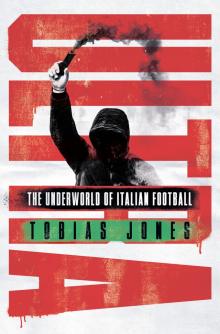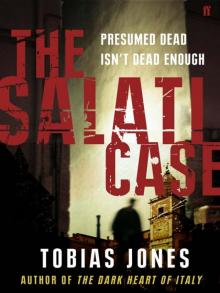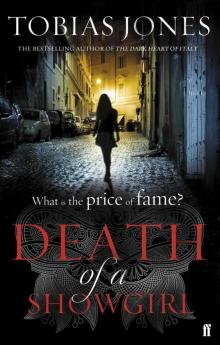- Home
- Tobias Jones
The Salati Case
The Salati Case Read online
THE SALATI CASE
Tobias Jones
For John Carnegie
Contents
Title Page
Dedication
Monday
Tuesday
Wednesday
Thursday
Friday
Saturday
Sunday
by the same author
About the Author
Copyright
Monday
I was looking for Via Repubblica 43, but the fog was thick. I could barely see the doors, let alone the numbers. I had got a call out of the blue an hour ago, asking me to go and see some notary called Crespi.
Eventually I found 43 chiselled into the stone at head height. Below was a brass rectangle with black letters: ARMANDO CRESPI, NOTARY.
I rang the buzzer and a female voice gave me directions over the intercom, ‘left-hand staircase, fourth floor’.
The wooden door into the palazzo was so large that there was another smaller one inside which now clicked open.
I walked up the stone staircase slowly, not knowing who Crespi was or what he wanted.
‘Permesso,’ I said as I walked into an opulent front office of walnut wood and burgundy leather.
The receptionist looked at me. ‘Castagnetti?’
I nodded. People only give me my full surname when things are formal. Everyone else calls me Casta.
‘Please have a seat,’ she said. ‘I’ll let Dottor Crespi know you’re here.’
I sat down and looked around. There was a business newspaper placed at the centre of a round table. On the walls were dark oil-paintings. The whole office felt formal and old fashioned.
The quick click of the woman’s heels on the marble floor announced her return. ‘He’ll be with you shortly.’
A few minutes later a short, white-haired man came into the reception area. ‘Castagnetti? My name’s Crespi. I’m so sorry to have kept you waiting. Please come this way.’
The notary led me down a wide corridor and held a door open for me. He motioned for me to sit down. He went behind his desk and leaned to his right to open a drawer and pull out a folder. Every movement seemed slow and precise. He put the folder on the desk between us and laid his thin fingers on top of it.
‘You’re a private investigator, am I right?’
I shrugged. ‘I offer my clients clarification.’ That was what I always said. ‘Offro chiarimenti.’ I clear things up.
He looked at me through narrowed eyes. ‘You look younger than I expected,’ he said.
I shrugged again. ‘How can I help?’
He smiled briefly. It looked like a muscle spasm. ‘A client of mine passed away on Friday. She has left a testament which is—’
‘Name?’
The notary paused to acknowledge the interruption. ‘Salati, Silvia.’ The inversion of the first and second names was deliberately formal. ‘For reasons of the correct disposal of her estate’, he went on, ‘it is necessary to certify as to the legal status of her younger son, a certain Salati, Riccardo. He was reported missing in the summer 1995 and is almost certainly deceased. But his legal status is currently “missing”. My late client’s estate can only be distributed if that assignation can be changed to “presumed dead”. ’
‘You want me to prove he’s dead?’
‘The will requires that,’ he held up a letter and pulled on his glasses. His voice went up a semitone to indicate that he was quoting from the old lady. ‘… due investigation should take place to reconstruct exactly what happened to my younger son Riccardo.’
‘Younger son? How many children are there?’
‘Two. The older brother being Salati, Umberto.’ Crespi raised his eyebrows at me like I should recognise the name. The legalistic inversion of surname and Christian name was beginning to irritate me. ‘He owns Salati Fashions on Via Cavour,’ Crespi explained.
Another clothing boutique. By now, almost the only shops left in the centre of town are those selling speed-stitched cloth from the Far East.
‘This isn’t a murder case, Castagnetti. All my client would be commissioning you to do is to verify the legal status of the subject.’
‘You need a “missing” turned into “dead”?’ My tone was at odds with the mellifluous phrases of the notary, who paused again, as if to acknowledge my vulgarity.
‘All you would be required to do’, he stared at me, ‘is to form an opinion upon whether the man in question is dead or alive.’ He threw his palms upwards, as if to say that it was the simplest task in the world. ‘If I may say, Signora Salati was a client of mine all her adult life. I personally saw the devastation her son’s disappearance had upon her. This isn’t merely a request to help with archiving a case; this is a chance to allow a kind, honest woman to rest in peace.’
It was quite a speech. The notary looked pleased with it. He was nodding his head slowly with his eyes reverently shut.
I thought it over quickly. It sounded like an unpromising proposition. I preferred the fresh cases, where there was hope.
The old ones meant faltering memories and no happy ending, if there was an ending at all.
‘Big estate?’
‘That is confidential and, if I may say, irrelevant. Suffice to say that it’s the standard estate of a woman who had been economically comfortable for thirty years. Allora?’
‘And the terms of the will?’
‘The terms of the will have no relevance to your investigation. In fact, it’s precisely the opposite.’
‘Meaning?’
‘She left an open will. Which means that her executors were given the facility to rewrite it according to the results of your investigation. Her will requires independent proof of her second son’s status before her estate is disposed of. That disposition is determined by whether or not the boy is “missing” or “presumed dead”.’
I hate notaries. Each one creates their own refinement of arrogance. Not even Crespi, I thought, would be without an interest.
‘Tell me more about the case,’ I said.
The notary drew breath. ‘I know very little about it. The subject in question disappeared from the train station on the night of San Giovanni 1995.’
‘When’s San Giovanni? August sometime?’
The notary looked at me, surprised I didn’t know. ‘24 June.’
‘No police investigation?’
‘His common-law wife in Rimini reported him missing three days later. The carabinieri filed the report and that was that.’ ‘They didn’t investigate?’ ‘There was no evidence of a crime having been committed.
And Riccardo had a bit of a history of disappearing. They were reluctant to waste public money looking for a man who had a habit of being, shall we say, on the road.’
‘No sightings since?’
‘Nothing.’
I looked at the meticulous little notary who was uncapping a fat fountain pen as if to draw up the contract.
‘My standard fee’, I said, ‘is two thousand euros per week. I take five thousand up front to cover expenses. I report and invoice on a weekly basis.’
The notary jotted the figures down hastily and stood up to shake hands. ‘My secretary will issue you a cheque for your expenses.’ He passed me a card so I passed him one back. ‘Come and see me in a week’s time. Chiaro?’
‘Chiarissimo.’
Back on the street I tried to think in straight lines. Silvia Salati had died only a few days ago. They had to find Riccardo not because there had been some sighting or contact, but simply for routine. Riccardo’s mother had died and there was an estate to be distributed, nothing more. The case was as cold as the Salati woman. It seemed actuarial, not human: it was about the direction of money, not about the whereabouts of a man who
had probably been dead a good decade.
The more I thought about the case, the less I liked it. I knew that my report was expected to be just a rubber stamp, something that was needed in order to release funds. I wasn’t expected to solve something, just to tick a few boxes. There were bound to be ‘interests’ in the case. There were always ‘interests’ that slanted things, external pressures which tried to push it in one way or another.
The old woman had presumably left something: a house, maybe a few savings. Her heirs would be more interested in finding Riccardo dead than alive. Someone, and it was probably Umberto Salati, would be hoping I could prove as much. That way there was one less person with whom to share the estate. Not that that made much sense if the widow died poor.
I headed towards the centre of town. The damp claustrophobia of Padanian fog sucked the colours off the city. It felt isolating because you couldn’t see more than a few metres ahead. The place felt so humid that even the cobbles seemed to sweat.
I tried to walk on tiptoe to move my stubborn, busted ankle. It always got worse in winter. The weather seemed to stiffen it up and I spent my time drawing circles with the toes of my foot, trying to loosen up the rigid scar tissue. It had happened a long time ago. Someone had tried to give me a foot massage with a security door. I didn’t walk for a while.
I looked at the blurred people coming towards me through the fog. Women in egg-shaped fur coats. Men with pencil goatees. Orange buses and elderly cyclists.
It was a strange city. It had been transformed since I was a boy. There used to be old eccentrics living in town, the descendants of families who had lived in a particular borgo since Maria Luigia was Duchess. Children played football in the cobbled backstreets. There had been artisans: the carpenters and cobblers and tailors. Now, though, everyone had moved to the suburbs. In the centre there were only clothing boutiques and phone-dealerships selling glinting handsets made you- know-where. The rest were banks and legal offices and various ‘authorities’.
But somehow the city had retained its charm. It was cut in half by a river and that meant you could only reach the other side by using one of half a dozen narrow bridges. They became arteries where you saw friends and friends of friends. It was a city small enough for coincidences to happen and where everyone had some sort of connection to everyone else.
That was why I liked this time of year. It was the only season when the place offered anonymity. Visibility was reduced to twenty or thirty metres, and for once you could limp around without fear of being recognised. This was the only time you could really go about your business unseen.
Not that I really understand what my business is. I have no company, no headed notepaper, no staff. I don’t advertise. Now I think about it, I don’t even know how Crespi got hold of me.
But I’m always busy. There’s always employment for someone who lives off the dirt. And I do the dirtiest: fraud, missing persons, anti-mafia, omicidio. The only thing I don’t do is infidelity. I don’t mean in my private life, because there’s no one there to be unfaithful to. I mean I don’t snoop with a telephoto, trying to prove that people are putting it about. I don’t do it because it’s sordid and sad and – like the fog – it’s all the same.
But that’s how I got started in this line. That’s how everyone starts off. Marina, an old friend of mine from way back, thought her husband was cheating on her. She said she was certain of it, said she wouldn’t even trust him to put out the rubbish any more. He denied it until he was red in the face, swore on his blessed mother’s life that he would never betray her. He used to get furious with her, said she was demented.
She was telling me about it one day and I just offered to find out. As soon as I said it she was gripping my hand, pleading with me to give her back a bit of certainty in her life. She said she would arrange to go away one weekend and we would see what happened. Half an hour after her man had dropped her at the station he was unbuckling another woman’s bra.
Before I knew what was happening, every cuckold in Emilia-Romagna wanted my help. That’s how I discovered I had a talent for something useful. I could give people the truth. I found I had a talent for getting to the heart of things, for finding out about what had been hidden or covered up. I had a half-decent radar for deceit. People began to bring their injustices to me, perhaps because they sensed it was a subject I understood. They brought me their terrors and their tragedies. ‘Where is my wife?’ they would plead, or ‘Who killed my daughter?’ I never understood why they asked me. Maybe they asked everyone and I was the only one who offered to help.
And I don’t know why I did. At the beginning it might have been kindness, looking into troubles because some people seemed to have an unfair amount of them. I listened to their stories and asked questions in return. Question after question until someone didn’t want to reply.
But it’s not kindness any more. I’ve seen what polite people can do and I don’t trust politeness or kindness any more. It’s just a job and I do it for the money. And I take the money because the costs are so high: after a few months in this line you lose trust in everything. When you’ve seen that much betrayal and deception, you can’t trust what you see, let alone what you don’t. Everyone becomes a suspect. Mauro says that’s why I’m no good with women. I always look for a motive, and when someone says they’re in love, that they’re living without an ulterior motive, I worry about what they’re really up to.
I waited for a pause in the traffic to cross the road. Cars loomed out of the damp cottonwool air and sped past. I felt my ankle throbbing and leaned on my right instead.
I decided to go and look at Salati Fashions and turned into Via Cavour. It was there on the right on the way to the Battistero.
Through the shop window I could see a man who looked like the proprietor. Salati must have been mid-fifties. He had a thick grey moustache which covered the top of his mouth. It was yellowing on the right-hand side so I assumed he was a smoker. He looked thick set, like he had rounded out in recent years.
I watched a couple walk into the shop and Salati was on them, offering help, pulling hangers off the rails. I watched the way the man smiled at the young couple. He put his head on one side, a move that made him look as manipulative as a six-year-old in plaits.
The couple left the shop and I heard Salati offer them a curt buongiorno as if he were saying get lost. I walked through the door before it had sprung shut.
‘Umberto Salati?’
‘Yes.’
‘I’m Castagnetti. I’m a private investigator.’
Salati hesistated and tried to get his eyebrows to touch. ‘You’re the person who’s going to verify,’ he paused out of delicacy, ‘as to the status of my brother, is that right?’
‘It is.’
‘He’s already hired you?’
‘Crespi? This morning.’
‘Tell me your name again.’
‘Castagnetti.’
He looked aggrieved.
‘What did he tell you?’
‘Nothing.’
‘How did he find you?’
‘I didn’t ask.’
He clicked his tongue and walked around the shop shuffling hangers. He looked nervous. ‘You know someone is trying to pretend Riccardo is alive?’
‘How do you mean?’
‘The mourning notices in the paper today … there was one from Riccardo.’ He must have seen me perk up, because he quickly tried to damp down any excitement. ‘Riccardo’s not alive,’ he said, holding my stare. ‘Someone wants us to think he is, but he’s long gone, I’m afraid.’
‘So why would someone pay to publish a mourning notice in the newspaper?’ I asked.
He shrugged. ‘That’s your job.’
‘When did she die?’ I asked quietly.
‘Friday.’ He looked up at me as if trying to work out why I had asked.
‘I’m sorry,’ I said quietly.
Salati sighed. ‘At least we saw it coming.’
In my line, I thoug
ht, it’s always coming. Only difference is, I’m supposed to do something about it. I looked up at Salati and he looked tired. I knew what it was like to lose a parent because I lost both a long time ago. Salati was in a bleak place.
I looked around the shop. There were light pink jumpers and shirts with extraordinarily large collars.
‘Coffee?’ he asked.
‘Thanks.’
‘Laura,’ he cooed to his young assistant, a girl whose body was perfect but for her cantilevered nose, ‘could you make us a coffee?’
There was something gentle in the way he spoke to her and I wondered if they were lovers. Most of the shopkeepers ended up taking their pretty assistants out for dinner as a prelude to showing them the finest hotel rooms in Romagna.
‘You’re not closing for lutto?’ I asked.
He shook his head. ‘It actually helps having something to do. We’re closing up later.’
Laura was out back now and I decided to iron out what I knew. ‘The night your brother disappeared, he was waiting for a train back to Rimini, right?’
‘He had bought a ticket. Some people came forward to say they had seen him buying a ticket.’
‘And then?’
‘Nothing. He was supposed to be going back to Anna in—’
‘Who’s Anna?’
‘His woman. They had a daughter, my niece.’
‘Called?’
‘Elisabetta.’
I was writing down the names. ‘Anna what? Salati?’
‘No, di Pietro.’
I wrote it down. ‘Do they still live in Rimini?’
‘Last I heard.’
‘You’re not in touch?’
‘On and off. Not as much as back then, but sure, we talk occasionally. Anna and my mother weren’t close.’
‘Why?’
‘You would have to ask Anna. But they didn’t get any closer once Ricky went missing. The opposite. Once it was clear
Ricky wasn’t coming back, we saw a lot less of her and of little Elisabetta. She was two I think when it happened.’
‘And what brought Ricky back this way that weekend?’

 Ultra
Ultra The Salati Case
The Salati Case Death of a Showgirl
Death of a Showgirl The Dark Heart of Italy
The Dark Heart of Italy